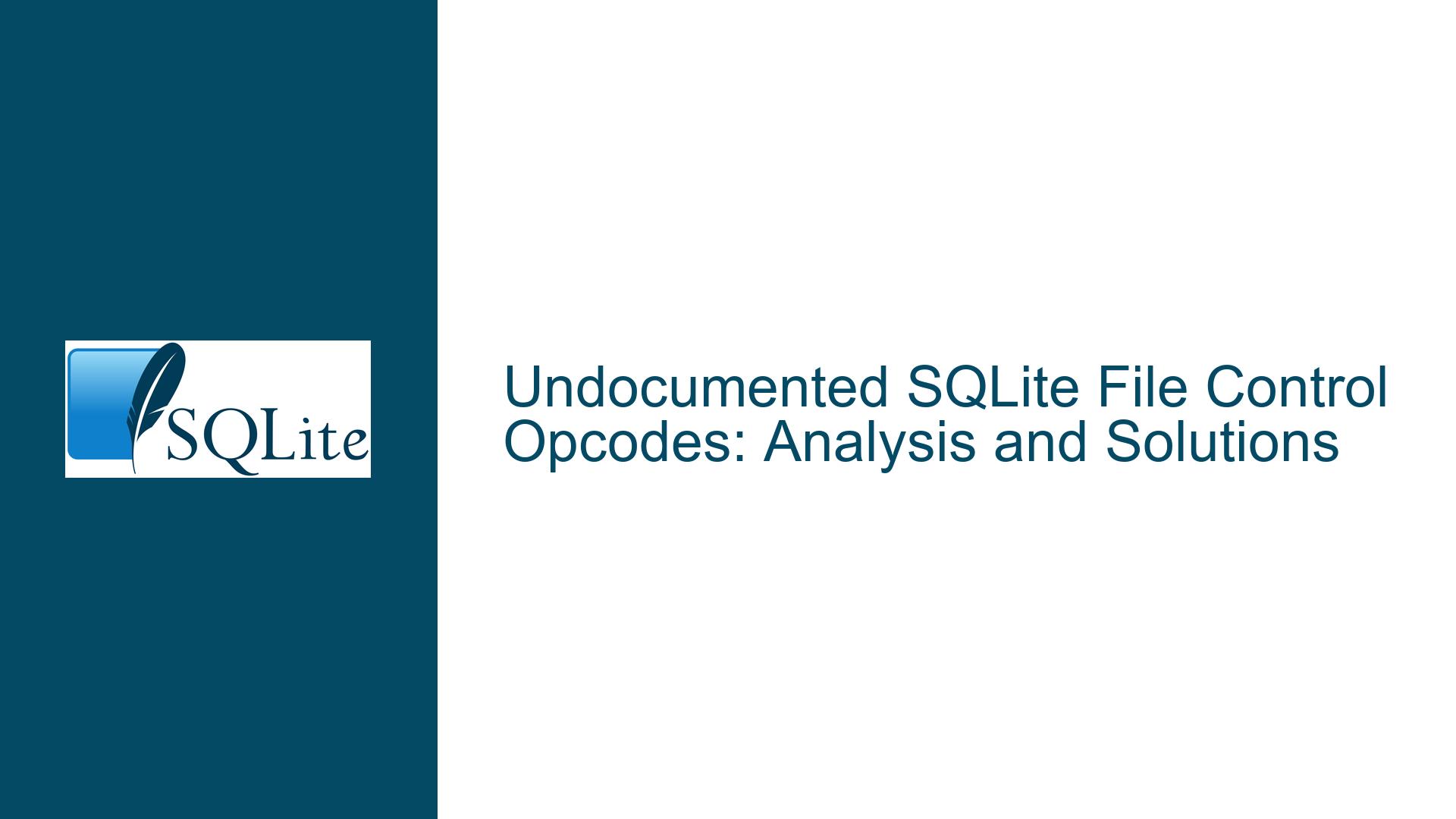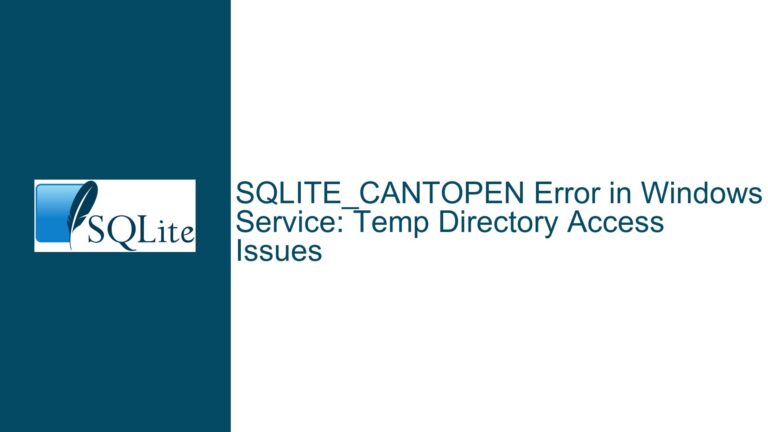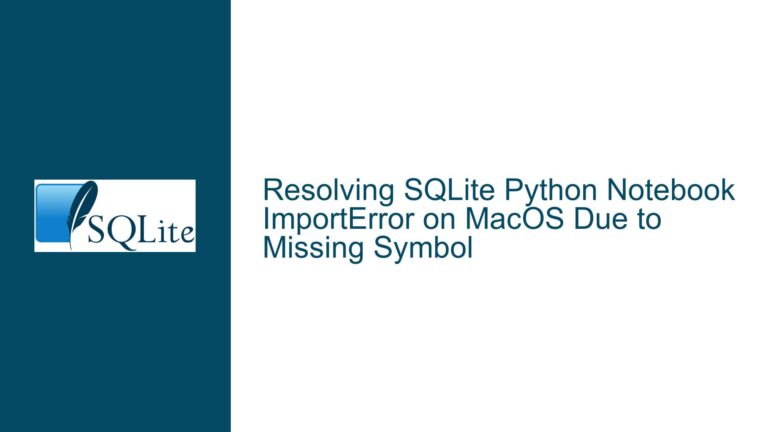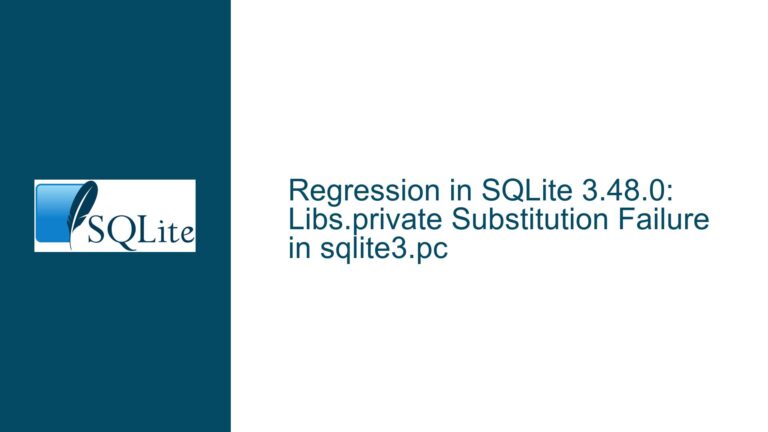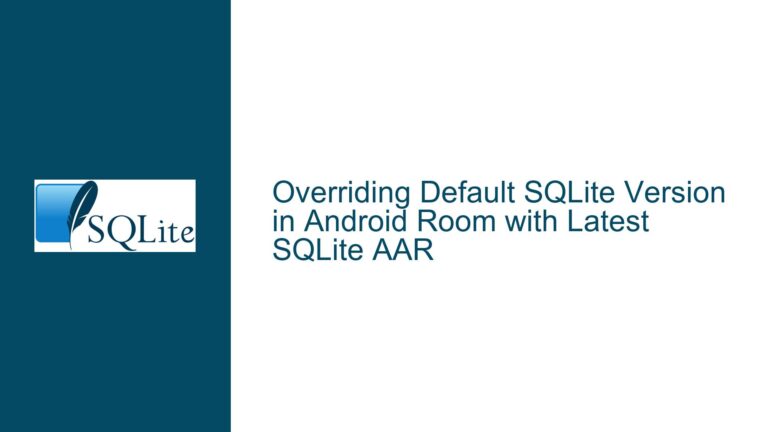Undocumented SQLite File Control Opcodes: Analysis and Solutions
Issue Overview: Undocumented and Misplaced File Control Opcodes in SQLite
The core issue revolves around the lack of comprehensive and centralized documentation for certain file control opcodes in SQLite. These opcodes, which are essential for advanced database operations, are either undocumented, poorly documented, or documented in disparate locations, making it difficult for developers to utilize them effectively. The discussion highlights specific opcodes such as SQLITE_FCNTL_RESERVE_BYTES and SQLITE_FCNTL_PDB, which are either partially documented or entirely undocumented despite being listed in the SQLite source code and header files.
The problem is exacerbated by the fact that some opcodes are marked as "no longer in use" without specifying which ones, leading to confusion and potential misuse. Additionally, the documentation for these opcodes is not well-organized, with some explanations buried in unrelated sections or entirely missing from the primary documentation. This lack of clarity can lead to incorrect implementations, runtime errors, or even security vulnerabilities if developers rely on assumptions or reverse-engineered behaviors from the source code.
The issue is not merely a matter of convenience but also of practicality. For instance, SQLITE_FCNTL_PDB appears to provide a pointer to the database connection, which could be useful for advanced operations such as dynamically identifying database names or managing multiple connections. However, without proper documentation, developers are left to infer its behavior from the source code, which is neither scalable nor reliable. Furthermore, the mutex behavior associated with SQLITE_FCNTL_PDB (holding SQLITE_MUTEX_STATIC_OPEN until the opcode is called) is undocumented, raising questions about thread safety and potential deadlocks.
The absence of a centralized and well-structured documentation for these opcodes creates a barrier for developers who rely on SQLite for lightweight, high-performance database solutions. This issue is particularly problematic for those who need to implement custom Virtual File Systems (VFS) or perform low-level database manipulations, as these tasks often require precise control over file operations.
Possible Causes: Why File Control Opcodes Are Undocumented or Misplaced
The lack of comprehensive documentation for SQLite file control opcodes can be attributed to several factors. First, SQLite is a highly modular and extensible database engine, with many features designed for specific use cases or advanced scenarios. As a result, some opcodes may have been introduced for internal use or experimental purposes and were never intended for public consumption. Over time, these opcodes may have been repurposed or retained for backward compatibility, but their documentation was never updated to reflect their current usage.
Second, the SQLite development team prioritizes stability and performance over feature expansion. This focus means that documentation efforts are often directed toward core functionalities and widely-used features, leaving niche or advanced opcodes under-documented. While this approach ensures that the majority of users have access to reliable and well-documented features, it leaves a gap for developers who require advanced capabilities.
Third, the decentralized nature of SQLite’s documentation contributes to the problem. For example, SQLITE_FCNTL_RESERVE_BYTES is documented in the context of the checksum VFS but not in the main file control opcodes documentation. This fragmentation makes it difficult for developers to locate relevant information, especially when working with multiple features or custom implementations.
Another contributing factor is the dynamic nature of SQLite’s development. As the database engine evolves, some opcodes may become obsolete or redundant, leading to their deprecation. However, the documentation may not always reflect these changes, resulting in outdated or misleading information. For instance, the mention of "no longer in use" without specifying which opcodes are affected creates ambiguity and undermines the reliability of the documentation.
Finally, the mutex behavior associated with certain opcodes, such as SQLITE_FCNTL_PDB, may be an oversight in the documentation. The SQLite development team may have assumed that such details are internal implementation specifics and not relevant to end-users. However, this assumption can lead to unintended consequences, as developers may inadvertently violate thread safety or introduce race conditions when using these opcodes.
Troubleshooting Steps, Solutions & Fixes: Addressing Undocumented File Control Opcodes
To address the issue of undocumented or misplaced file control opcodes in SQLite, developers and the SQLite community can take several steps to improve the situation. These steps range from short-term workarounds to long-term solutions aimed at enhancing the documentation and usability of these opcodes.
1. Review and Consolidate Documentation
The first step is to conduct a comprehensive review of the existing documentation to identify gaps and inconsistencies. This review should focus on the file control opcodes section, cross-referencing it with other parts of the documentation and the source code. Any opcodes that are mentioned but not explained should be documented, and their usage should be clarified. For example, SQLITE_FCNTL_RESERVE_BYTES should be explicitly documented in the main file control opcodes section, with a reference to its usage in the checksum VFS.
2. Clarify Deprecated or Obsolete Opcodes
The documentation should clearly indicate which opcodes are deprecated or no longer in use. This clarification can be achieved by adding a dedicated section or annotation for deprecated opcodes, along with a brief explanation of their historical context and recommended alternatives. For example, if SQLITE_FCNTL_PDB is no longer in use, this should be explicitly stated, and developers should be advised to use alternative methods for accessing database connections.
3. Document Mutex Behavior and Thread Safety
For opcodes that involve mutexes or other thread synchronization mechanisms, the documentation should provide clear guidelines on their usage. This includes specifying which mutexes are held during the execution of the opcode and any potential risks or limitations. For instance, the documentation for SQLITE_FCNTL_PDB should mention that it holds SQLITE_MUTEX_STATIC_OPEN until the opcode is called, and developers should avoid opening additional databases during this time to prevent deadlocks.
4. Provide Examples and Use Cases
To make the documentation more practical and accessible, it should include examples and use cases for each opcode. These examples should demonstrate how to use the opcode in real-world scenarios, along with any necessary setup or cleanup steps. For example, the documentation for SQLITE_FCNTL_RESERVE_BYTES could include a sample implementation of a custom VFS that uses this opcode to reserve additional bytes for checksums.
5. Engage the Community for Feedback
The SQLite development team should actively engage with the community to gather feedback on the documentation and identify areas for improvement. This engagement can take the form of forum discussions, surveys, or collaborative documentation efforts. By involving the community, the development team can ensure that the documentation meets the needs of a diverse range of users and use cases.
6. Implement a Documentation Versioning System
To address the issue of outdated or inconsistent documentation, SQLite could implement a versioning system that tracks changes to the documentation over time. This system would allow developers to access historical versions of the documentation and understand how opcodes have evolved. Additionally, it would provide a clear audit trail for deprecated or modified opcodes, making it easier to identify and address discrepancies.
7. Create a Centralized Knowledge Base
To reduce fragmentation and improve accessibility, SQLite could create a centralized knowledge base that consolidates all documentation related to file control opcodes. This knowledge base would serve as a single source of truth for developers, providing comprehensive and up-to-date information on all opcodes, their usage, and any associated risks or limitations.
8. Develop a Testing Framework for Opcodes
To ensure the reliability and correctness of file control opcodes, SQLite could develop a testing framework that validates their behavior under various conditions. This framework would include unit tests, integration tests, and stress tests for each opcode, along with documentation on how to run these tests. By providing a robust testing framework, SQLite can give developers greater confidence in using these opcodes and reduce the likelihood of runtime errors or unexpected behavior.
9. Offer Training and Resources
Finally, SQLite could offer training and resources to help developers understand and use file control opcodes effectively. This could include tutorials, webinars, or workshops focused on advanced SQLite features, as well as a dedicated support channel for troubleshooting and guidance. By investing in developer education, SQLite can empower its users to leverage these opcodes safely and efficiently.
In conclusion, the issue of undocumented or misplaced file control opcodes in SQLite is a multifaceted problem that requires a combination of documentation improvements, community engagement, and developer education. By addressing these issues systematically, SQLite can enhance its usability and maintain its reputation as a reliable and versatile database engine.
